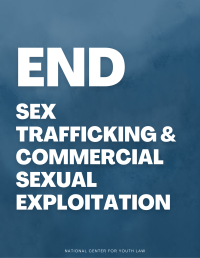NCYL Champions State Funding Efforts to End the Commercial Sexual Exploitation of Children
On June 20th, 2014, Governor Brown signed the 2014-2015 State Budget. For the first time, Governor Brown and California have made a commitment to better equip the child welfare agency to serve child victims of sex trafficking. Many children who have been exploited have prior involvement with the child welfare system—some providers find as many as 80% of identified victims. These children are bought and sold for sex on a routine basis, and face unfathomable violence at the hands of their exploiters and purchasers. Currently the primary way of identifying them is through an arrest for prostitution or a related offense. Although they are victims, they are routinely criminalized for acts they are forced to commit. The budget allocation and clarification to existing dependency law outlined in the trailer bill will begin to shift California’s approach to serving these children through a victim-focused rather than criminal lens.
The State Budget includes an allocation of $5 million from the General Fund to serve children who are victims of commercial sexual exploitation through the child welfare system. Funding will be used to provide training for county children’s services workers and foster caregivers in identifying, intervening, and providing services to exploited children. Beginning in 2015-2016, $14.3 million will be allocated annually to further support these efforts.
Language in SB 855, the budget trailer bill, creates the Commercially Sexually Exploited Children’s Program (CSEC Program), which counties may opt into starting in January 2015. Each county that elects to participate in the CSEC Program must form a multi-disciplinary team of the county’s child-serving agencies, and design an interagency protocol that guides the agencies on how to identify and serve CSEC.
SB 855 also makes an important clarification to existing law in California’s Welfare and Institutions Code Section 300 by specifying that children who are sexually trafficked, have exchanged sexual acts for food or shelter, or have been paid to perform sexual acts and whose parents or guardians failed to protect them may be served through the dependency system.
The new budget represents a victory for the National Center for Youth Law, the County Welfare Directors Association, and a larger coalition of advocates, all of whom have been calling for increased financial support from the state to end the commercial sexual exploitation of children in California.
Kate Walker, a staff attorney at NCYL, remarked, “Because of these changes, sexually trafficked children unequivocally fall under the purview of the child welfare agency. This will begin to shift California away from criminalization, and start treating these children as the victims of exploitation and abuse that they are.”





